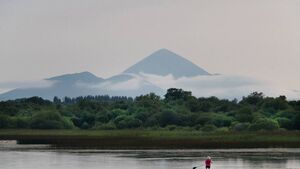We're not made for these sun-drenched days

Croagh Patrick rises majestically in the background as a paddle boarder enjoys the fine weather on Lough Lannagh in Castlebar last week. Picture: Alison Laredo
The thermometer outside my kitchen window read 28 degrees Celsius yesterday afternoon - a figure so preposterously alien to the natural order of things in County Mayo that I was compelled to rap the glass smartly with my knuckles, convinced the instrument had suffered some mechanical derangement. Alas, the reading held firm, as did the merciless orb responsible for this atmospheric transgression, hanging there in what should have been a decent grey sky with all the brazen impudence of a gatecrasher at a wedding.
Now, I am not a man given to meteorological hysteria. I have endured satisfyingly damp winters in this county, witnessed hailstones the size of golf balls, and maintained my equanimity through wind speeds that would challenge my vertical gait. But this current visitation - this prolonged assault by unfiltered solar radiation - represents something far more sinister than mere climatic variation. It constitutes nothing less than a fundamental violation of the atmospheric social contract that has governed civilised life in the west of Ireland since time immemorial.
The citizens of Mayo, you must understand, are engineered by heredity and habit for a specific set of environmental parameters. Our skin tone has evolved to complement the subtle gradations of cloud cover; our metabolisms are calibrated to function optimally in conditions of persistent moisture; our very temperaments have been shaped by centuries of what the tourist boards euphemistically term "changeable weather". To subject such finely tuned organisms to the sort of relentless illumination more properly associated with the Mediterranean basin is rather like forcing a beaver to build its home in the Sahara - technically feasible, perhaps, but hardly conducive to optimal results.
The morning constitutional, that sacred ritual whereby a gentleman of discernment surveys his domain whilst collecting his thoughts for the day ahead, has become an exercise in strategic timing worthy of a military campaign. Where once I could venture forth at any hour secure in the knowledge that the Irish sky would provide adequate protection from solar excess, I now find myself reduced to furtive dawn expeditions, scuttling through shadows like some nocturnal creature afraid of its own reflection. The indignity is compounded by the necessity of wearing what the Americans call a "baseball cap", a sartorial abomination that sits upon my head with all the natural authority of a tea cosy.
The domestic arrangements have required complete reconfiguration. My study, positioned these three decades to capture the maximum benefit of our customary diffused light, has transformed into a solar furnace that renders serious reading impossible after ten o'clock in the morning. I have been forced to relocate my scholarly pursuits to the scullery, where the temperature remains tolerable but the ambience suggests more of a bunker than a sanctuary for intellectual contemplation. The irony is not lost on me that I, who have spent decades lamenting the absence of adequate light for reading, now find myself overwhelmed by an excess of the very commodity I once craved.
The broader implications of this meteorological insurgency extend well beyond personal inconvenience. Irish conversation, that magnificent art form which has sustained our culture through eight centuries of political subjugation, depends absolutely upon the weather as its fundamental currency. Remove the reliable topic of rain, mist, and "soft days" and what remains? We become reduced to the sort of vapid commentary about sunshine and warmth that characterises the discourse of holiday destinations, places where people go specifically to avoid thinking about anything of consequence.
I observed this linguistic degradation firsthand at Johnny McHale's pub on Friday evening where the usual sophisticated analysis of cloud formations and precipitation probability had devolved into mindless observations about "lovely weather" and "perfect for the beach". As if County Mayo were some Riviera appendage rather than a serious landscape designed for serious contemplation of serious matters. The regulars sat there in their shirt sleeves, grinning like tourists and speaking in the simplified vocabulary of the perpetually sun-struck.
The commercial response to this crisis has proven equally dispiriting. Hardware shops that usually stock sensible items like rain gauges and thermal underwear have suddenly sprouted displays of sun cream and folding chairs. The local pharmacies now feature a prominent rack of what are termed "cooling products" - sprays and gels designed to provide artificial relief from natural conditions. There is something fundamentally un-Irish about requiring chemical intervention to cope with the weather, whatever its character.
Most disturbing of all has been the transformation of our natural environment. The bog, that repository of accumulated Irish history stretching back through millennia of properly damp conditions, has already begun to assume the consistency of concrete. Streams that have meandered thoughtfully through our valleys for generations are being reduced to a trickle. The very landscape appears to be suffering from a sort of meteorological culture shock, unsure how to respond to conditions for which it has no evolutionary preparation.
The psychological toll has proven equally severe. Irish melancholy, that refined emotional state which has produced our greatest literature and most profound insights into the human condition, requires specific atmospheric conditions to flourish. Sustained sunshine induces a sort of mental flattening, a reduction of emotional complexity that renders serious thought nearly impossible. I find myself incapable of achieving the proper mood for serious reading or contemplating the meaninglessness of existence when the sun persists in blazing down with Mediterranean vulgarity.
The social fabric has begun to show signs of strain. Conversations that should develop naturally over the course of an afternoon, lubricated by the gentle rhythm of intermittent showers, now conclude abruptly as participants flee indoors seeking refuge from the solar bombardment. The traditional Irish gathering - that informal congregation of neighbours united by shared atmospheric grievances - has become impossible to sustain when the very weather that should provide our common cause has transformed itself into an instrument of torture.
Even our clothing has rebelled against these conditions. The Aran jumper, that magnificent textile designed specifically for Irish atmospheric conditions, has become unwearable except in the early hours of dawn. I find myself reduced to garments of cotton and linen, fabrics that lack entirely the substantial character required for serious rural contemplation. There is something profoundly undignified about conducting one's daily affairs dressed like a holiday-maker when one's natural inclination runs toward the substantial woollens of a dignified countryman.
The meteorological authorities, with their characteristic combination of scientific pretension and practical uselessness, have issued various warnings about "heat exhaustion" and "dehydration", ailments that strike me as fundamentally foreign to the Irish constitution. We are a people evolved to cope with dampness, chill, and the occasional horizontal precipitation. Our bodies simply lack the necessary mechanisms for processing sustained warmth, much as a vintage motorcar lacks the equipment required for modern motorway conditions.
As I write this - on the fifth morning of our meteorological siege - the sun continues its relentless assault with undiminished enthusiasm. The forecast suggests another two days of this atmospheric barbarism before normal service resumes. I have taken refuge in the coolest corner of the house, armed with a large whiskey and the grim satisfaction of knowing that this too shall pass - that Ireland's natural climate will eventually reassert itself and restore the proper order of things.
Until then, we endure. But let this serve as a warning to future generations: when the weather abandons its proper Irish character, civilisation itself hangs in the balance.





